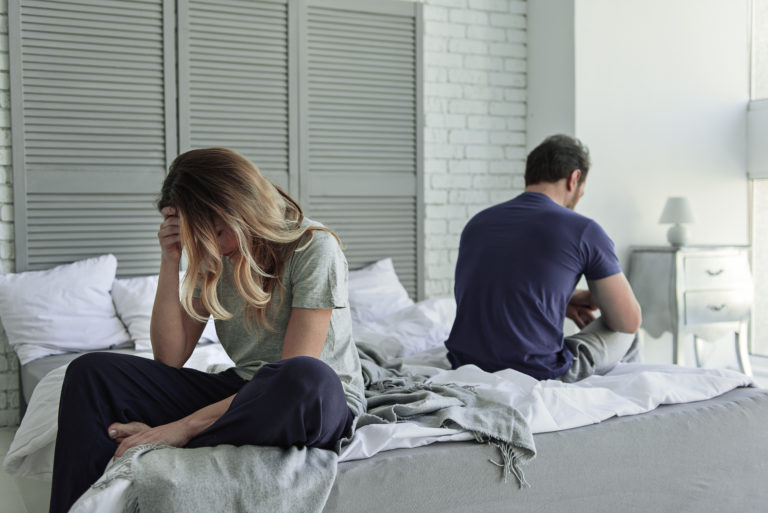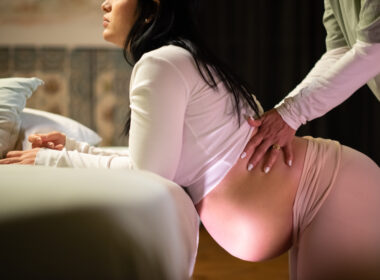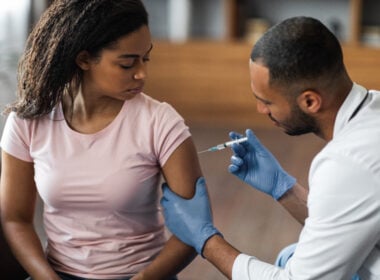Your libido is your desire and motivation for sex. Also known as your sex drive, your libido (or lack thereof) can be an important sign of the state of your reproductive health. As a woman, your libido can also clue you into where you are in your menstrual cycle, as most women’s libidos naturally peak around ovulation.
FAM and a healthy libido
Learning a Fertility Awareness Method (FAM) or Natural Family Planning (NFP) can help a woman understand the ups and downs of different hormones during her menstrual cycle, and therefore what natural fluctuations in libido look like.
Lost your sex drive? This could be the reason
If your relationship is wonderful but you just can’t seem to get in the mood, know that it may not be all in your head! The following issues can all cause loss of libido, even in the most loving of relationships.
Painful sex
It should be no surprise that painful sex can contribute to a woman’s loss of libido. There are multiple reproductive health conditions that may make sex painful, including endometriosis, polycystic ovary syndrome (PCOS), and others, many of which are addressed in the articles, below. For many of these issues, treatment from a restorative reproductive medical (RRM) provider, and/or pelvic floor physical therapy can help you regain your enjoyment of sex (and hopefully your libido along with it!).
Hypoactive sexual desire disorder (HSDD) and Female Sexual Dysfunction (FSD)
The DSM-V, the professional “Bible” of the American Psychiatric Association, no longer recognizes HSDD as a distinct sexual disorder. Instead, it now folds HSDD and female sexual arousal disorder into “female sexual interest/arousal disorder.” HSDD is characterized by a lack of desire for sex that lasts at least six months and causes “clinically significant personal distress.” This definition overlaps with that of female sexual dysfunction (FSD) but is more specific, focusing solely on desire rather than problems with arousal or orgasm. Know too, that this diagnosis refers to a decrease in sexual desire that is not explained by any medical condition, hormonal birth control use that started in adolescence and continued for at least two years, other medications (like antidepressants), pregnancy or recent childbirth, menopause, other sexual issues, your partner’s sexual problems, relationship issues, and stress or fatigue.
Birth control and loss of sex drive
One of the greatest paradoxes about birth control is that, while it may make sex seem more available to women, it can tank women’s libidos, making them feel less in the mood.
Birth control and low testosterone
For many women, hormonal birth control might be the main culprit in their lowered sex drive. This could have something to do with the fact that hormonal birth control suppresses testosterone levels in women, the hormone that is responsible for sexual arousal in women (as well as men). Lowered levels of testosterone might not only negatively affect a woman’s sex drive, but also her sexual satisfaction. Low testosterone is also linked with vaginal dryness, which makes sex less enjoyable—even painful—for many women. Therefore women on the birth control pill may have a more difficult time “getting in the mood,” or experiencing arousal and orgasm.
Birth control and anxiety and depression
There’s also the matter of depression and anxiety—both of which can be symptoms of hormonal birth control use. For many struggling with depression, the condition may go hand-in-hand with a loss of libido or disinterest in sex. Low testosterone is associated with depression in women (and men), and as we’ve already discussed, low testosterone may cause decreased sex drive. Further compounding the issue, the antidepressant medications often used to treat depression and anxiety are also known for their libido-lowering effects.
Birth control and physical changes to the female anatomy
Birth control may also cause physical changes to the clitoris, labia, vaginal opening, and vulva. In one clinical study, birth control (both oral contraceptives and the vaginal ring) was actually shown to shrink the size of a woman’s clitoris. Another study found that oral contraceptives also thinned the tissue of both the labia minora and the vaginal introitus, and changed the vascularization of the vulvar tissue. These changes can make sex less desirable, less pleasurable (i.e., harder to achieve orgasm), and more painful for women.
Click on “References” below to view scientific references for loss of libido and its connections to birth control use.
This page was last updated on April 18, 2024.
For more information on libido, see the articles below.
-

Genitourinary syndrome of menopause (GSM): Can vaginal dryness pose a danger to your health?
By Kristen Curran • March 14, 2024Here’s when to go see a doctor -

What is hypoactive sexual desire disorder (HSDD) and how do you know you have it?
By Kristen Curran • March 14, 2024What’s the difference between FSD and HSDD? -

Little known signs of ovulation
By Alex Rico • July 21, 2023Does your face shape change when you’re ovulating? -

How men can encourage a switch from birth control to fertility awareness
By Alex Rico • July 7, 2023What if your spouse asked you to give up golfing? Or to stop watching football every Sunday? You… -

College hookup culture pulls women out of the driver’s seat when it comes to introducing sex in relationships
By Joe Malone • February 24, 2023In a previous article, we looked at the why behind hookup culture’s destructive impact on college-age women in… -

What’s happening in male vs. female brains during sex?
By Joe Malone • February 17, 2023In the process of writing my PhD dissertation about how young women’s overall health and wellness impact the… -

From menopausal incontinence to painful sex and everything in between, pelvic floor physical therapy can help treat all kinds of issues
By Anne Marie Williams, RN, BSN • December 15, 2022What to expect during a visit to a PFPT -

3 essential components of the female orgasm
By Cassondra Moriarty • November 4, 2022Why you need to forget the “G-spot” -

Healing from painful sex in 4 steps, and how pelvic floor physical therapy can help
By Mary Bruno • November 4, 2022In Part 1 of my story, I explained how I came to discover that my many years of… -

“Sex should never be painful:” The connection between endometriosis and painful sex
By Mary Bruno • November 4, 2022Decked out in my white strapless dress trimmed with a subtle sweetheart neckline (and just a touch of…




